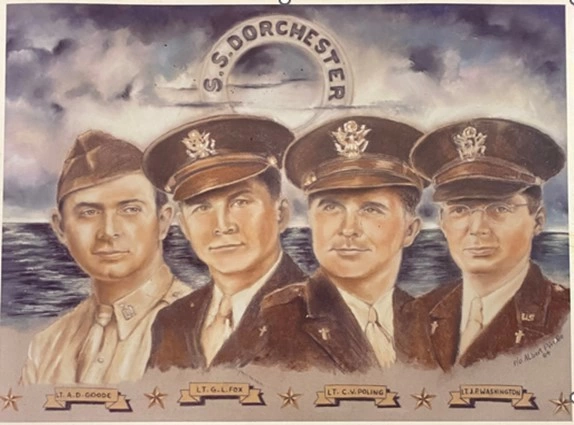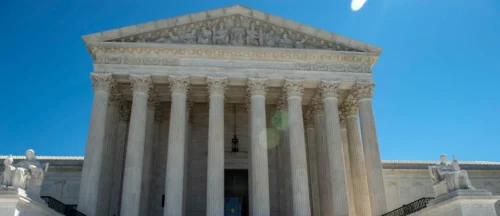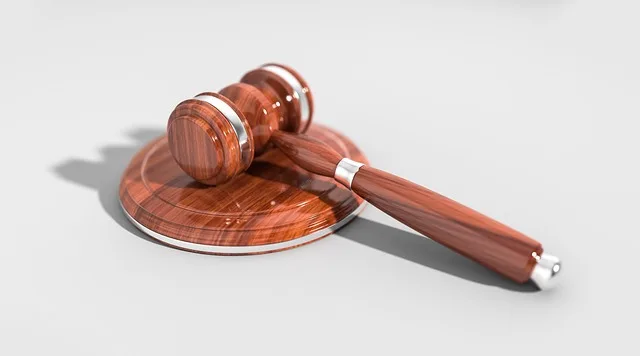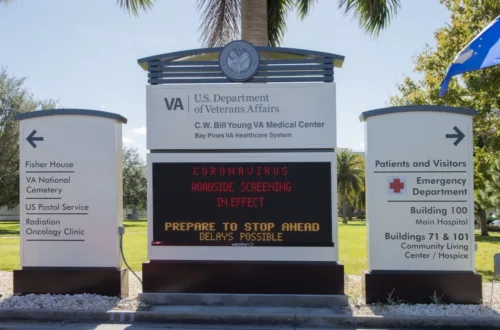Four Chaplains Day, February 3rd

Four Chaplains Day is commemorated every year on February 3rd. It’s a day to honor four military chaplains who sacrificed their own lives to save their fellow service members during a tragic event in World War II. For those in uniform who know the story, it’s a powerful example of service before self. If you’ve never heard the story of the Four Chaplains, you’ll find their story hard to forget.
Who Were the Four Chaplains?
The Four Chaplains were Methodist minister the Reverend George L. Fox, Reformed Church in America minister the Reverend Clark V. Poling, Reform Rabbi Alexander D. Goode (PhD), and Roman Catholic priest Father John P. Washington. The four men met while attending Chaplains School at Harvard University.
George Lansing Fox, a native of Lewistown, Pennsylvania, was born on March 15th, 1900. He served in World War I as an Army Medical Corp Assistant after leaving school at 17 and subsequently lying about his age to enter the army. For his service, Fox was awarded the Purple Heart, the Silver Star, and the French Croix de Guerre to commemorate his bravery during the First World War.
As the world plunged into World War II, Fox accepted an appointment as an Army chaplain on July 24, 1942, and began active duty on August 8, 1942. After completing Army Chaplains School at Harvard University, he reported to the 411th Coast Artillery Battalion at Camp Davis in North Carolina.
- Clark Vandersall Polling, born in Columbus, Ohio, on August 7th, 1910, was a 1936 graduate of the Yale University Divinity School in New Haven, Connecticut. He applied to serve as an Army Chaplain and accepted his appointment on June 10, 1942. On June 25, he reported to the 131st Quartermaster Truck Regiment at Camp Shelby, Hattiesburg, Mississippi.
- Reform Rabbi Alexander D. Goode (Ph.D.) was born on May 10, 1911, in Brooklyn, New York. He obtained his Bachelor’s degree for the rabbinate at Hebrew Union College in 1937 and subsequently went on to receive a Ph.D. from Johns Hopkins University in 1940.
- Rabbi Goode originally applied to be a Navy Chaplain in 1941 but was denied. After the attack on Pearl Harbor in 1941, he felt called to apply again, this time as an Army Chaplain. He received his appointment on July 21, 1942, and went on active duty on August 9, 1942.
- John Patrick Washington was a native of Newark, New Jersey, born on July 18th, 1908. He became an ordained priest on June 15th, 1935. Soon after the attack on Pearl Harbor thrust the United States into World War II, Washington received his appointment as an Army chaplain. He reported for active duty on May 9, 1942, and was assigned to the 76th Infantry Division in Ft. George Meade, Maryland in June.
>> Active Duty Military Benefits Guide <<
Sinking of the SS Dorchester
The four Chaplains reported to New York to board the USAT Dorchester to start their new European assignments. The Dorchester left New York on January 23, 1943, with a convoy of ships headed for the Army Command Base at Narsarsuaq in southern Greenland. The vessel carried a total of 904 service members.
During the voyage, the U.S. Coast Guard detected submarine activity in the area the convoy was meant to travel to. During this time, German U-Boats were known to monitor sea lanes, which required Captain Hans J. Danielsen to put the ship’s crew on high alert.
This order mandated that the service members sleep in their clothing and keep their life jackets on most of the time. However, many disregarded these orders and slept without clothes due to how hot it would get in the ship’s hold.
Many also opted not to wear their life jackets because they were so bulky and uncomfortable. This approach to safety had tragic consequences on the day of February 3rd, 1943, at approximately 12:55 AM when the German submarine U-223 torpedoed the Dorchester off the coast of Newfoundland.
The ship’s electrical system was destroyed, which caused panic and for people to be trapped below the decks in total darkness. During this chaos, the Chaplains worked together to try and restore calm and help as many people as possible. This unity was extraordinary, considering the men’s different religious backgrounds and the historical context of the era.
What the Survivors Said
The accounts of the survivors illuminate the horrific situation and the heroism of the Four Chaplains. After the supply of life jackets ran out every service member had one, each Chaplain removed their own life jacket and gave it to others. They also helped as many as they could onto lifeboats.
As he floated in the frigid Arctic water, surrounded by debris, oil, and his dead shipmates, Private William B. Bednar stated he heard “men crying, pleading, praying”, he also heard “the Chaplain’s preaching courage. Their voices were the only thing that kept me going.”
Petty Officer John J. Mahoney recalled that, when he retrieved his gloves for protection against the Arctic cold, Rabbi Goode stopped him, said, “Never mind. I have two pairs,” and gave Mahoney the gloves from his hands. The Petty Officer later realized Rabbi Goode’s sacrifice: the rabbi did not have two pairs of gloves, but gave his only gloves to Mahoney as he intended to remain on the Dorchester.
Another survivor, Grady Clark, described a nightmarish scene he saw as he swam away from the ship: “The flares had lighted everything. The bow came up high, and she slid under. The last thing I saw, the four chaplains were up there praying for the men’s safety. They had done everything they could. I did not see them again. They did not have a chance without their life jackets.” The four then linked arms, said prayers and sang hymns as they went down with the ship.
The water temperature was 34 degrees, and the air temperature was 36 degrees. The harsh conditions caused many to die of hypothermia before rescue ships could reach them. Out of the 904 service members aboard the Dorchester, only 230 survived, and the sacrifice of the Four Chaplains became an important symbol of selfless service.
Posthumous Medals
Nearly two years after the tragic sinking of the SS Dorchester, Congress posthumously awarded each of the chaplains the Purple Heart and the Distinguished Service Cross on December 19th, 1944.
Because of their ultimate sacrifice, members of Congress also wanted to award the Medal of Honor to each Chaplain posthumously, but this was not possible because of a technicality – the heroic actions of the Chaplains occurred after the torpedo attack was over and not during active fire, which is a requirement to receive the medal.
Instead, Congress authorized the Four Chaplains Medal, designed to have the same weight and importance as the Medal of Honor. A unanimous act of Congress eventually approved this on July 14, 1960, and Secretary of the Army Wilber M. Brucker presented the medals to the next of kin of each Chaplain at Ft. Myer, Virginia on January 18, 1961.
>> Active Duty Military Benefits Guide <<
Honors Dedicated to the Four Chaplains
Due to their sacrifice, the Four Chaplains have had various honors dedicated to them. The below list represents a portion of these honors.
Four Chaplains Day
In 1988, Congress established Four Chaplains Day as an annual commemoration every February 3rd. Observations of this day vary from place to place. Some politicians issue official proclamations; sometimes, the flag will fly at half-mast. Additionally, various military groups, civilian groups, and organizations conduct commemorative services and programs in many locations throughout the nation.
Memorial Service to Commemorate Four Chaplains Day
Every year on or around Four Chaplains Day, multi-faith memorial services are held. There are various ways people may choose to symbolize the Four Chaplains including four candles, pictures of each chaplain, or four life jackets placed in chairs or on easels. The American Legion has a free guide that offers recommendations for holding a service to commemorate Four Chaplains Day.
Four Chaplains Commemorative Stamp
The Four Chaplains have been commemorated through a stamp designed by Louis Schwimmer, the head of the Art Department of the New York branch of the United States Post Office. This stamp was issued in 1948 and is unique because it was issued less than ten years after the tragic death of the Four Chaplains, where generally, U.S. stamps are not issued in honor of someone other than a president until at least ten years after their death.
Chapel of the Four Chaplains
President Harry S. Truman dedicated the Chapel of the Four Chaplains in the Great Baptist Church in Philadelphia on February 3rd, 1951. As a part of his speech, he stated, “this interfaith shrine… will stand through long generations to teach Americans that as men can die heroically as brothers so should they live together in mutual faith and goodwill”. The chapel served as a reminder of the interfaith spirit of the Four Chaplains until it was moved to the chapel at the Philadelphia Navy Shipyard.
The Four Chaplains Memorial Foundation
Located in the decommissioned Navy Yard of South Philadelphia, the Four Chaplains Memorial Foundation is housed in the former Naval Chapel. This foundation was founded by the families of the Chaplains and three survivors of the Dorchester and is currently the only national 501(c)(3) charity related to the Four Chaplains’ legacy.
The foundation’s official mission statement is “to further the cause of unity without uniformity”, and it conducts various activities in support of this mission including:
- Honoring individuals whose deeds symbolize the legacy of the four chaplains;
- Supporting memorial services that honor the memory of the chaplains;
- The publication of the Guidelines for Four Chaplains Interfaith Memorial Services;
- Sponsoring an “Emergency Chaplains Corps” to provide support for first responders in disaster situations;
- Conducting scholarship competitions for graduating high school seniors. The competition focuses on the values of “inclusion, cooperation, and unity” exemplified by the Four Chaplains story. This includes a National Art Scholarship contest, a National Essay Scholarship contest, and a National Project Lifesaver Scholarship contest.
>> Active Duty Military Benefits Guide <<
About the author
Sarah Tucci
Sarah is a Philadelphia-based writer. She comes to CollegeRecon with an interdisciplinary background in international relations and cultural heritage with an interest in understanding the intersection of armed conflict and cultural heritage, particularly in Eastern and Southeastern Europe. When not writing for CollegeRecon, Sarah enjoys traveling, watching documentaries, and hanging out with her beloved Pitbull, Brutus.


